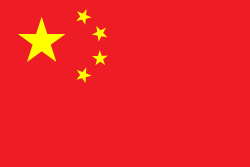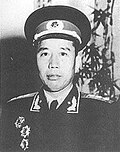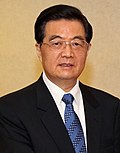| Vice President of the People's Republic of China | |
|---|---|
| 中华人民共和国副主席 | |
 | |
 | |
| Style | Mr. Vice President (副主席) (informal) His Excellency (阁下) (diplomatic) |
| Type | Deputy state representative |
| Status | Deputy national-level official |
| Residence | Zhongnanhai |
| Seat | Zhongnanhai West Building, Beijing [1] |
| Nominator | Presidium of the National People's Congress |
| Appointer | National People's Congress |
| Term length | Five years, renewable |
| Constituting instrument | Constitution of China |
| Inaugural holder | Li Yuanhong (Republican era) Zhu De (current form) |
| Formation | 1 January 1912 (Republican era) 27 September 1954 (current form) |
| Abolished | Between 1975 and 1982 |
| Unofficial names | State Vice Chairman |
| Vice President of China | |||||||
|---|---|---|---|---|---|---|---|
| Simplified Chinese | 中华人民共和国副主席 | ||||||
| |||||||
| Alternative Chinese name | |||||||
| Simplified Chinese | 国家副主席 | ||||||
| |||||||
 |
|---|
The Vice President of China, officially titled the Vice President of the People's Republic of China, is the deputy to the president of the People's Republic of China, the state representative of China. Similar to the Chinese president, the vice president is a ceremonial office and has no real power in China's political system. [a] The Premier is the second-highest ranking official in China.
Contents
- History
- Selection
- Eligibility
- Election
- Powers
- List of vice presidents
- Central People's Government (1949–1954)
- The 1st Constitution (1954–1975)
- The 4th Constitution (1982–present)
- See also
- Notes
- References
The office originated in the Republican era when Li Yuanhong became the provisional vice president of China after the founding of the Republic following the 1911 Revolution. It was abolished in 1917, but restored in 1947, with the adoption of the Constitution of the Republic of China. The ROC post has continued to exist in Taiwan following the government's retreat to the island. The vice presidency in the People's Republic of China was first established with the adoption of the Constitution in 1954 by the National People's Congress (NPC), with the official English-language translation of "state vice chairman". The post of vice chairman was abolished under the Constitution of 1975 together with the chairman, then reinstated in the Constitution of 1982. Since 1982, the title's official English-language translation has been "vice president", although the Chinese title remains unchanged. The new constitution stipulated that the vice president could not serve more than two consecutive terms; the term limits were removed in 2018.
Under the current constitution, the vice president is elected by the National People's Congress, the country's supreme organ of state power, and serves at its pleasure. According to the constitution, the principal duty of the vice president is assisting the president in their duties. The vice president may exercise part of the functions and powers of the president on the president's behalf when so entrusted by the president. The vice president assumes the presidency in case the office becomes vacant until a new president is elected by the NPC. The importance of the vice presidency has varied with the officeholders; some vice presidents have been members of the Chinese Communist Party (CCP)'s Politburo or Politburo Standing Committee. The vice president has also generally assumed a more major role in China's foreign relations, and has usually served as a member of CCP's Central Foreign Affairs Commission and Central Leading Group on Hong Kong and Macau Affairs. The incumbent vice president of China is Han Zheng, who took office in 10 March 2023.













